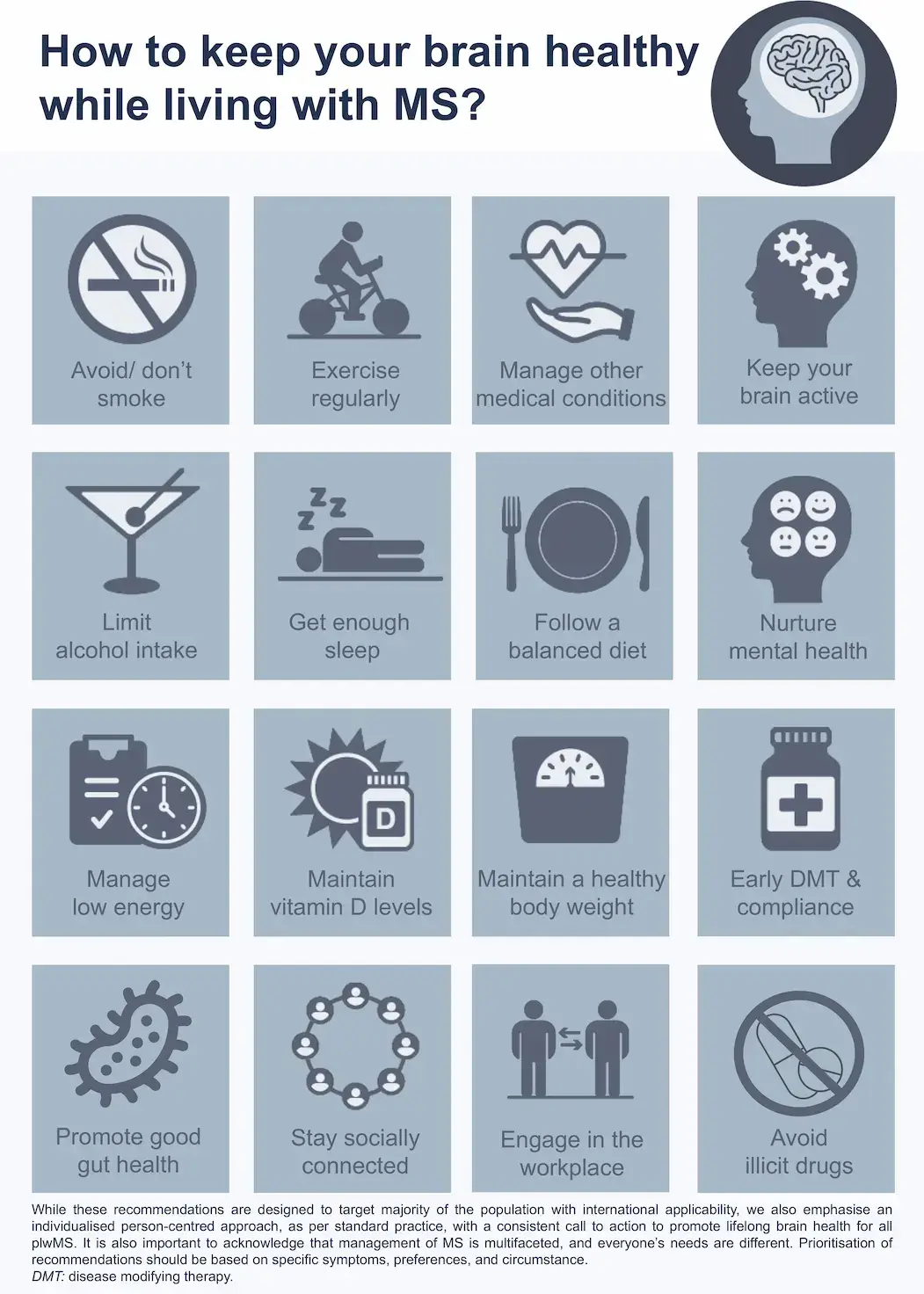Articles
16 Evidence-Based Lifestyle Changes to Protect Your Brain Health in Multiple Sclerosis
Published: November 26, 2024
Author: Dr. Achillefs Ntranos MD

Living with multiple sclerosis (MS) brings unique challenges, but emerging research shows that specific lifestyle changes can significantly impact your brain health and quality of life.
As an MS specialist neurology clinic in Beverly Hills, we are excited to share these evidence-based recommendations that can help you take control of your brain health.
Why Brain Health Matters in MS?
Your brain's health directly influences how well it can compensate for MS-related changes. Think of it like building a savings account – the more brain-healthy habits you maintain, the more resilience you develop against MS symptoms and progression.
Understanding Brain Health in Multiple Sclerosis
Before diving into specific recommendations, it's important to understand that your brain has an remarkable ability to adapt and compensate for MS-related changes.
Brain health refers to the brain's ability to function effectively, maintain neuroanatomical connectivity, and preserve cognitive abilities. In MS, preserving brain health is crucial as it can help mitigate disease progression and improve quality of life.
Key Lifestyle Recommendations for Brain Health in MS
1. Engage in Regular Physical Activity and Exercise
Regular physical activity is one of the most powerful tools for protecting brain health in MS. Research shows that exercise can:
- Improve cognitive function
- Reduce fatigue
- Enhance mood
- Maintain muscle strength, flexibility, and balance
- Potentially have neuroprotective effects
Getting Started with Exercise
Start with activities you enjoy, whether it's gentle walking, swimming, or yoga. Gradually increase intensity and duration as you build strength and endurance. Consult your healthcare provider before starting a new exercise program.
- Aerobic Exercise: Aim for at least 150 minutes of moderate-intensity aerobic activity per week, such as brisk walking, cycling, or swimming.
- Strength Training: Include resistance exercises 2-3 times per week to maintain muscle mass.
- Flexibility and Balance: Incorporate stretching, yoga, or tai chi to improve flexibility and balance.
2. Prioritize Sleep and Rest
Quality sleep is essential for brain health and symptom management. Sleep disturbances are common in MS and can exacerbate symptoms.
Key sleep strategies:
- Maintain a Consistent Sleep Schedule: Go to bed and wake up at the same time each day.
- Create a Relaxing Bedtime Routine: Engage in calming activities before bed.
- Optimize Your Sleep Environment: Keep your bedroom cool, dark, and quiet.
- Address Sleep Disorders: Discuss any sleep disturbances with your neurologist; conditions like insomnia, sleep apnea, or restless legs syndrome may require treatment.
Sleep Hygiene
Good sleep hygiene enhances cognitive function and reduces fatigue.
- Aim for 7-9 Hours: Most adults need at least 7 hours of sleep per night.
- Create a Sleep-Friendly Environment: Keep your bedroom cool, dark, and quiet. Avoid looking at bright screens before bedtime.
- Establish a Routine: Go to bed and wake up at consistent times.
If you experience sleep disturbances, discuss them with your neurologist for potential solutions.
3. Adopt a Balanced, Nutritious Diet
While there's no specific "MS diet," research supports following a balanced, brain-healthy eating patterns:
- Emphasize Whole Foods: Include plenty of fruits, vegetables, whole grains, lean proteins, and healthy fats.
- Consider the Mediterranean Diet: This diet pattern is associated with anti-inflammatory effects and may be beneficial in MS.
- Stay Hydrated: Adequate hydration is important for overall function.
- Limit Processed Foods and Sugars: Reduce intake of processed foods, saturated fats, and added sugars.
Consider consulting your MS specialist or a registered dietitian experienced in MS for personalized dietary advice.
4. Manage Mental Health and Stress
Mental well-being plays a crucial role in brain health. MS is associated with higher rates of depression and anxiety.
Strategies for Mental Health:
- Mindfulness and Meditation: Regular practice can reduce stress and improve mood.
- Counseling and Therapy: Professional support can help manage depression, anxiety, and adjustment to MS.
- Stress Reduction Techniques: Deep breathing, progressive muscle relaxation, and engaging in hobbies can alleviate stress.
- Social Support: Connect with others to share experiences and receive emotional support.
Important Note
Your mental health is as important as your physical health.
5. Foster Social Connections
Maintaining strong social relationships can:
- Improve cognitive reserve
- Reduce stress and feelings of isolation
- Enhance overall well-being
Building Social Connections
- Join Support Groups: Participate in MS support groups, either in-person or online.
- Engage in Community Activities: Volunteer or participate in community events.
- Stay Connected: Regularly communicate with friends and family.
6. Maintain a Healthy Weight
Weight management is important in MS, as obesity can contribute to increased disability and comorbid conditions.
Strategies:
- Combine Diet and Exercise: A balanced diet and regular physical activity are key.
- Set Realistic Goals: Focus on gradual, sustainable changes.
- Professional Support: Consider working with a dietitian or a weight management program.
7. Limit Alcohol Intake and Avoid Illicit Drugs
Excessive alcohol consumption and illicit drug use can have detrimental effects on brain health and exacerbate MS symptoms.
- Follow Guidelines: If you choose to drink, adhere to national guidelines for alcohol consumption. Avoid binge drinking.
- Avoid Illicit Drugs: They can have long-term effects on brain function.
If you need help reducing alcohol intake or quitting drugs, you can always ask for professional assistance.
8. Keep your Brain Active
Engaging in mentally stimulating activities keeps your brain sharp.
- Learn New Skills: Try a new hobby, language, or musical instrument.
- Brain Games: Puzzles, crosswords, and memory games can be beneficial.
- Stay Organized: Use calendars and reminders to aid memory.
If you notice changes in cognitive function, consult your neurologist or a neuropsychologist.
9. Continue Meaningful Work or Activities
Staying active in professional or volunteer roles can enhance brain health and provide a sense of purpose.
Tips:
- Work-Life Balance: Balance your professional responsibilities with self-care.
- Adaptations: Utilize assistive technologies or modify your work environment to accommodate your needs.
- Occupational Therapy: Consult an occupational therapist for strategies to maintain productivity.
10. Early Intervention with Disease-Modifying Therapies (DMTs)
Starting disease-modifying therapies early can delay MS progression.
- Discuss Options: Work with your MS neurologist to find the most suitable DMT.
- Adherence Matters: Take medications as prescribed for maximum effectiveness.
- Regular Monitoring: Attend follow-up appointments to assess treatment effectiveness and adjust as needed.
Important Note
Being involved in treatment decisions empowers you in your MS journey.
11. Manage Low Energy Levels and Fatigue
Fatigue is a common and debilitating symptom of MS.
Management Strategies:
- Energy Conservation: Prioritize activities and schedule rest periods.
- Exercise: Regular physical activity can improve energy levels over time.
- Sleep Hygiene: Ensure quality sleep to reduce fatigue.
- Medications: Discuss with your healthcare provider; several medications can help manage fatigue.
12. Cognitive Rehabilitation
Cognitive rehabilitation can help manage cognitive changes in MS.
- Work with a Neuropsychologist: They can develop personalized strategies to address cognitive challenges.
- Practice Cognitive Exercises: Memory games, puzzles, and brain training apps can help maintain cognitive function.
13. Address Comorbid Medical Conditions
Managing other health conditions is vital for overall brain health.
Recommendations:
- Regular Health Check-Ups: Monitor blood pressure, blood sugar, cholesterol, and other health markers.
- Manage Cardiovascular Risks: Conditions like hypertension and diabetes can affect brain health.
- Medication Management: Take all prescribed medications as directed.
- Avoid Polypharmacy: Work with your healthcare provider to minimize unnecessary medications.
14. Promote Good Gut Health
The gut-brain connection plays a significant role in MS.
- Probiotics and Prebiotics: Include fermented foods and high-fiber foods in your diet.
- Gut-Healthy Foods: Consume foods rich in fiber, such as fruits, vegetables, and whole grains.
15. Maintain Optimal Vitamin D Levels
Vitamin D deficiency is common in MS and may influence disease activity.
Guidelines:
- Get Tested: Have your vitamin D levels checked.
- Supplement if Necessary: Your healthcare provider can recommend appropriate supplementation.
- Safe Sun Exposure: Moderate sun exposure can help increase vitamin D levels; remember to protect your skin.
16. Smoking Cessation
Smoking can worsen MS symptoms and disease progression.
- Seek Support: Quitting smoking can be challenging, but support is available.
- Nicotine Replacement Therapy: Consider using nicotine replacement products to help quit.
Important Note
Quitting smoking is one of the most important steps you can take to protect your brain health.

Behavior Change Strategies to Implement Lifestyle Recommendations
Making lifestyle changes can be challenging, but the following strategies can help:
- Set Specific Goals: Define clear, attainable objectives.
- Create a Plan: Outline steps to achieve your goals.
- Seek Support: Rely on healthcare professionals, family, and friends.
- Monitor Progress: Keep track of your achievements and setbacks.
- Stay Positive: Celebrate successes and be patient with yourself.
Important Note
These lifestyle recommendations work best alongside, not instead of, your prescribed medical treatments. Always discuss changes with your healthcare team.
Taking the Next Step: Your Brain Health Journey
Making lifestyle changes can feel overwhelming, but you don't have to do it alone. At Achilles Neurology MS Clinic, we provide comprehensive support to help you implement these brain-healthy practices effectively.
Ready to take control of your brain health? Contact our office to schedule a consultation with Dr. Ntranos, our MS expert in Beverly Hills and Los Angeles. Together, we'll create a personalized plan that incorporates these evidence-based lifestyle recommendations into your MS management strategy.
Let's work together to protect and enhance your brain health, one step at a time.
Schedule an MS Consultation
Learn how we can support your brain health journey with personalized recommendations.
Related Reading
Explore more comprehensive resources on multiple sclerosis:
- What is multiple sclerosis and its common symptoms? — A complete guide to MS symptoms, diagnosis, and treatment options.
- Understand your MS treatment options — Learn how to choose the right disease-modifying therapy and know if it's working.
- MS specialist in Los Angeles — Visit our top-rated MS clinic in Los Angeles for personalized, expert care.
About the Author
Dr. Achillefs Ntranos MD
Board-Certified Neurologist
Achilles Neurology Clinic
Dr. Achillefs Ntranos MD is a board-certified neurologist and MS specialist known for his thorough evaluations and compassionate approach. Originally from Greece, he trained at Johns Hopkins University and Mount Sinai Hospital before founding Achilles Neurology Clinic in Beverly Hills to deliver comprehensive, patient-centered neurological care. He specializes in MS, autoimmune neurology, neuropathy, headaches, and other neurological disorders, blending research-driven insights with personalized treatment plans.